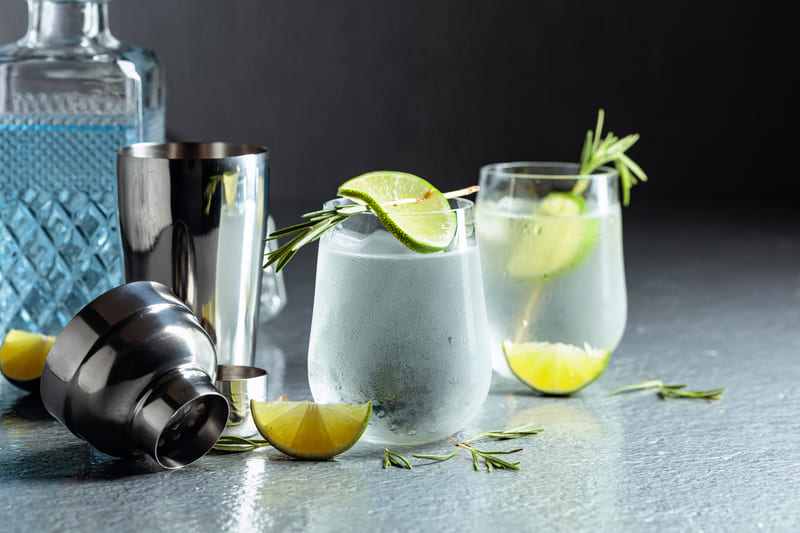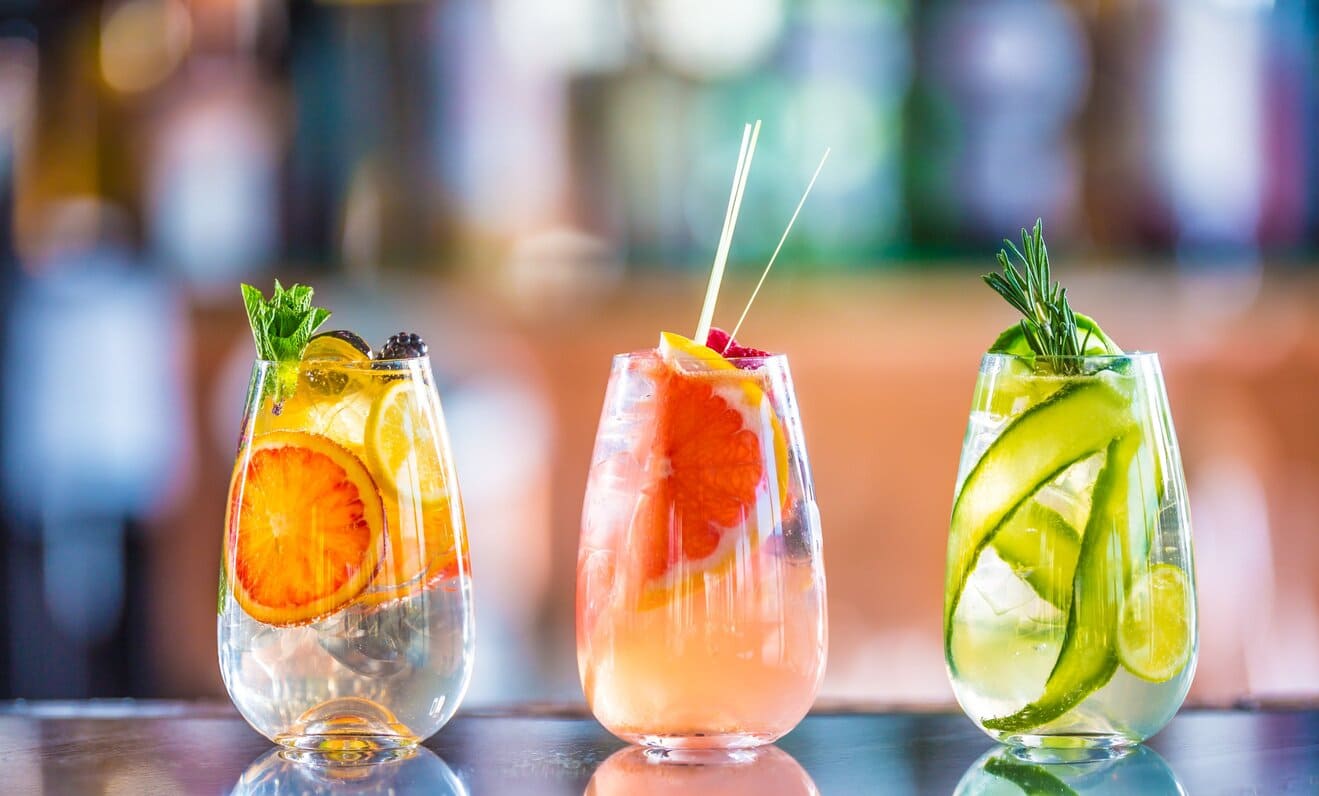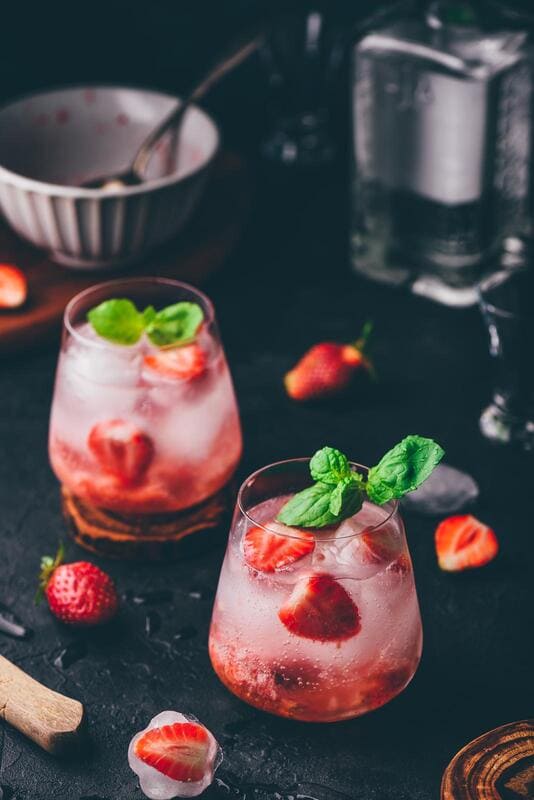Gin, a popular liquor among people of all ages, has arguably become the decade’s most trendy drink. With a variety of gins ranging from classics to fruity and floral to spicy, the liquor can be enjoyed whatever the weather. It is served on the rocks, with tonic water or lemonade, or even neat for those that can handle a strong drink.
However, sometimes, gin sits on a shelf or cabinet for months even years, untouched or open. If gin sits in pristine condition for a long time, does it go bad? Does unopened gin go bad?
How to Store Gin
Gin is no different to other distilled alcohols – it should be kept in a cool dry area, away from sunlight. It is better if the place you are storing your gin has a stable and consistent temperature – a cupboard, pantry or even a basement are great places to keep your gin.
The ideal temperature to store gin is around 6ºC. Do not store your gin near any heat sources, whether it be a window, a radiator or a cooker.
It is recommended that gin bottles are usually stored upright on a flat surface, especially if the cork is made of a natural product.
If these corked bottles are stored sideways, the alcohol can cause the cork to mix with the gin – depending on its quality, it could dissolve and make the gin taste a bit off.
This is only a problem with natural corks; those with artificial corks are more than safe to store laying down.
The lid of the gin bottle should be kept very tight if it has been opened before as the gin could evaporate or change flavour once exposed to the air.
Open gin should always be stored with a tight lid – do not keep a pourer attached. The gin will begin to evaporate and its ABV will weaken as time goes on as alcohol evaporates faster than water. We will explore this possibility later.
If your gin is open, many people recommend keeping it in the fridge. Keep reading to see whether gin really needs to be refrigerated.
More: Does Moonshine Go Bad?
What should I do if I have drunk only half a bottle?
If you are not a frequent gin drinker but still have less than half a bottle left, it is recommended to pour the gin into a different smaller bottle.
When gin is exposed to air, it begins to deteriorate. Therefore, a smaller bottle leaves less empty space for air, meaning that the gin is less likely to fall encounter oxygen.
This will keep your gin in a good condition for a few months to a year, so you can enjoy it at another time.
Also check: How Long Does Vodka Last?
How long does gin last?
Gin bottles do not come with an expiration date, no matter how hard you search for one – companies legally do not have to give gin an expiration date. This is because gin has a very long shelf life – it is a hard spirit so is safe for consumption for an unlimited period of time.
Most gins have a 40% ABV, which means mould and bacteria struggle to grow in it. However, one must not assume that gin does not go bad. Although it will be safe to drink and arguably last forever, the quality and taste of gin does deteriorate overtime.
When a gin bottle is opened, the process of oxidation begins because of the oxygen that is now present in the bottle. The more oxygen there is inside of the bottle, means the more oxygen there is available to mix with the alcohol.
When a bottle is opened and the top is left off, even more oxygen enters the bottle – make sure you do not lose the lid. Even if it is sealed shortly after, the oxidation process has begun.
Oxidation is the main factor responsible for the deterioration of the gin’s flavour. Once the seal is broken, oxygen can then enter the bottle. The process of oxidation can consequently change the taste – and arguably ruin – of the gin.
During oxidation, oxygen and water begin to mix with the alcohol molecules, which causes their structure to change. The oxidation leads to less alcohol in the drink, which lowers the ABV. It can differ greatly than the labelled ABV on the bottle, having a more dull and weak taste.
However, the process of oxidation is quite slow and normally takes over a year to come into effect.
An unsealed bottle is also at risk to microorganisms and contaminants. Yet, the high alcohol ABV means that it would take decades or longer for the gin to spoil.
The best-tasting gin will be consumed within a few months to a year since it was opened. You can drink an opened bottle of gin years later, but the taste will not be brilliant, or even the same as it was when you first purchased it.
To slow down the process of oxidisation, keep gin in a cool dark place. It is recommended to finish a bottle of gin within two years of opening it.
Also check: 30 Best Gin Cocktails
How long does unopened gin last:
As previously mentioned, the shelf life of gin is infinite. As long as your bottle of gin is unopened, it can sit – sealed – forever and the taste will not be affected.
A dark cupboard is the best place for unopened bottles of gin because it cannot be affected by outside control factors, like heat.
Some people keep gin for a long-period of time, hoping that it gets better with age. However, seeing as gin comes in bottles – it won’t age and get better over time. It will stay exactly the same. It is not the same as other alcohols, like wine, which get better over time.
Your alcohol will stay protected and keep its impeccable taste as long as you don’t break the seal. It will be just as tasty in years to come.
How To Tell If Gin Is Bad
Just because your gin is sealed, it does not mean it is in perfect condition. With all food or drink that will be consumed, you should always check the quality of it before consuming.
With sealed gin, there should be no issue, but with unsealed bottles, there may be a chance that your gin is not in the best state.
It is quite simple to tell if your gin has gone bad. The state, smell and taste of the liquid are all big giveaways.
The first ‘bad’ test is to see if your gin has anything floating in it. If you do not know how long your gin has been sitting in your cupboard, it is best to check the liquid’s quality. If there are particles in the gin, it is probably best to throw it away.
The second test is the smell. If nothing is floating in your gin, but there is an unusual smell, again it is probably safer to discard your gin. If the smell is bad, the taste will definitely be bad too.
The final test is the most important – the taste test. If the taste is not brilliant, but also not unbearable, you could try mixing the gin with a stronger tonic. However, if this does not improve the gin and the taste makes it undrinkable, dispose of it.
Is old gin safe to drink?
Gin has such a high ABV that it makes it near impossible for contaminants and mould to grow in it. It would take a very long time for gin to become unsafe – it is likely a bottle of gin will be safe for your whole lifetime.
It may not be pleasant to drink, but it will not make you ill. So in these terms, gin cannot go bad and become unsafe to drink.
Gin and cold temperatures:
Lots of cocktail recipes state that gin cocktails should be served cold. Although the gin may taste better and have a smoother feel in your mouth, it is not actually a necessity.
Gin does not need to be refrigerated, it won’t preserve the liquid any differently, but it may make your drink taste better.
Some people choose to freeze their gin. The 40% ABV means that the liquid won’t actually freeze and the bottle won’t explode. It is a nice way to have gin in the summer and has a soft mouthfeel, especially when served with more ice cubes.
However, not all gin should be stored in the freezer. If gin is made from natural ingredients – such as flavoured gin – or it is unfiltered with particles in it, do not freeze it as the liquid could partially freeze and change the taste.
Another gin not to freeze is a gin liquor; it has a lower ABV of around 20%, which can make the liquid more susceptible to freezing.
Gin and warm temperatures:
As previously mentioned, it is best to keep your gin in a cool – not necessarily cold – place. If your drink gets too warm, the taste will start to go.
Heat harms gins by altering the botanicals responsible for its flavour, it will change them meaning your gin will not taste anywhere near the same as it did before.
Gin depends on botanicals when it is being distilled – without them it would be tasteless and almost like a plain spirit, similar to vodka.
The botanical flavours, primarily juniper berries, are referred to as the ‘top notes’ of gin. Unfortunately, these top notes are the weakest parts of gin and are most likely to be damaged by heat.
Heat can also damage your gin by causing evaporation as alcohol evaporates quicker than water due to its low boiling point. Evaporation can occur at room temperature, but it is quite unlikely. It can occur in both sealed and unsealed bottles of gin, but it takes a lot longer with sealed bottles.
Evaporation also targets the botanicals, with the top notes again being more susceptible to this damage. This also leads to a duller and weaker drink.
Sunlight is a major problem for gin. Too much sunlight will change the chemical structure of gin due to its UV radiation. It causes the bonds inside the alcohol to break and change; these damaged molecules will change the gin’s flavour from its original intended flavour.
Does gin become discoloured?
Classic gin will not become discoloured – it is clear and stays pretty much the same across its lifespan. However, some vibrant gins do begin to fade in colour over time.
This is not because your bottle is fault, but in fact it is the way that coloured gin is made. The natural colourings used in gins mean they quickly become to fade as they are not artificial.
Natural colourants such as rhubarb are frequently used in gins, resulting in a popular pale pink colour. But sunlight will cause these organic colours to fade.
This does not mean that your gin is off – unless it has been open for months, as previously stated. The gin is still safe to drink, it just won’t have its same vibrant colour.
So does gin go bad?
The popular spirit clearly does not go bad over time if it’s unopened. It will stay exactly the same as the day you purchased it. However, unsealed gin can go bad if it is left open for a few months or years. But bad does not necessarily mean unsafe.
The high ABV of gin means that is harmless and can avoid contamination. The only way gin goes bad is if the taste or smell go off after oxidation.



